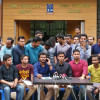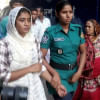Parliamentary body favours quota reform
The parliamentary body on public administration ministry yesterday suggested that the quota system in government jobs should not be abolished completely though Prime Minister Sheikh Hasina had earlier announced that it would be scrapped.
The committee also came up with the opinion that there should be a “reasonable reform” of the existing quota system in line with the spirit of the constitution.
“The parliamentary body thinks that the reform of the quota system has to be done logically so that it is acceptable to all," HN Ashiqur Rahman, chief of the parliamentary watchdog, told reporters after a meeting at the Jatiya Sangsad Bhaban.
He added, "Though the prime minister [Sheikh Hasina] had announced that the quota system in the government jobs will be scrapped totally, we think that the system should remain and a reasonable reform should be brought instead.
“We have responsibility towards history, towards Bangladesh and towards the backward community. We should bring a reform to the quota system considering these issues.”
Ashiqur also added that the issue of equity has been mentioned in the constitution. “We should handle the quota reform issue in a way that no one can hatch a conspiracy centring it.”
Meeting sources said Mozammel Haque Khan, senior secretary of public administration ministry, told the meeting that they were waiting for prime minister's instruction over the quota reform.
“We will act according to the prime minister's instruction after she returns home,” he said.
On April 11, Hasina said the quota system in public service recruitment would be abolished, and asked students to return to classes ending demonstrations over the demand for quota reforms.
“The quota system stands scrapped to stop repeated sufferings [of people] and avoid hassles of tackling movement time and again. This is clear," she said in parliament in response to a supplementary question.
The PM came up with the sudden announcement amid countrywide demonstrations of public and private universities' students for reform of the quota system. The protesters blocked key points in the capital and also roads and highways elsewhere in four days since April 8.
She also said, “If we go for reforms [of the quota system], another group will come up after a few days and say 'we want further reforms'. This issue will keep coming, if the quota system remains. But if it ceases to exist, there will be no problem. So, there's no need for having the quota system."
The PM, however, said a different arrangement would be made so that members of ethnic minorities and physically-challenged people could get government jobs.
The quota system was introduced through an executive order in 1972 and was amended several times. Currently, 44 percent are reserved for candidates from merit list and the rest for various quotas.
Of the 56 percent, 30 percent is kept for freedom fighters' children and grandchildren, 10 percent for women, 10 percent for people of districts lagging behind, 5 percent for members of indigenous communities, and one percent for physically-challenged people.

 For all latest news, follow The Daily Star's Google News channel.
For all latest news, follow The Daily Star's Google News channel. 








Comments